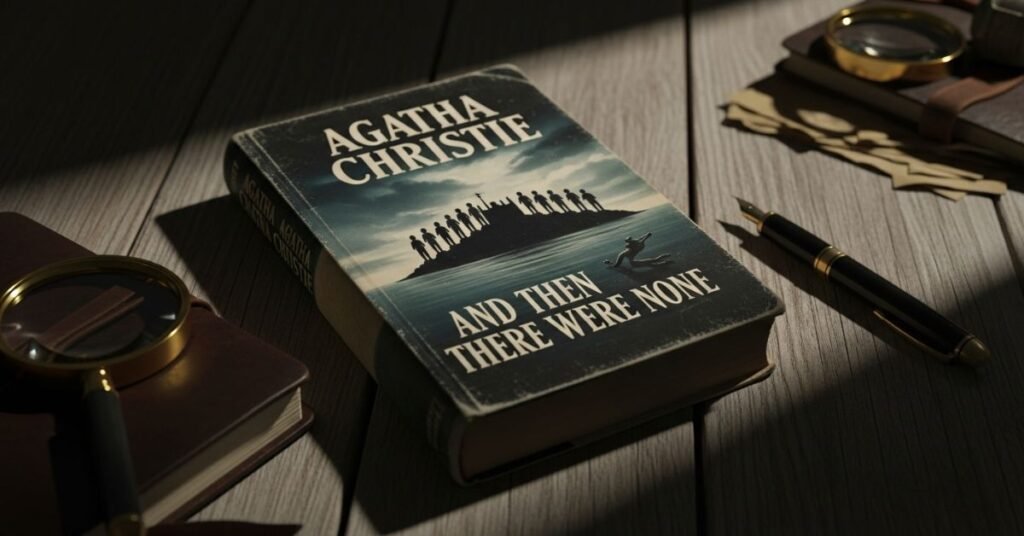
Ten people, all strangers to one another, were invited to a large, isolated house on Soldier Island, just off the Devon coast. The invitations came in different forms—some were asked to visit by old friends, others offered jobs, and some promised a pleasant holiday. When they arrived, they were welcomed by the housekeepers, Mr. and Mrs. Rogers, who explained that their employer, a mysterious Mr. U. N. Owen, would be joining them later. None of the guests had ever met their host, and the secrecy about him gave everyone a faint sense of unease.
That first evening, after dinner, a voice suddenly boomed through the house from a gramophone recording. It accused each person present of having committed a crime for which the law could not touch them. Justice Wargrave, a retired judge, was charged with wrongly condemning a man to death. Vera Claythorne, a former governess, was accused of letting a child drown to secure another’s inheritance. Philip Lombard, an adventurer, was accused of leaving a group of natives to die. Emily Brent was accused of driving a servant girl to suicide. General Macarthur had sent a young officer to his death during the war. Dr. Armstrong was accused of killing a patient while operating drunk. Tony Marston had run over two children with his car. Mr. and Mrs. Rogers were accused of withholding medicine from their employer to inherit money. Each guest denied their guilt or made excuses, but uneasiness spread.
Shortly after the accusations, the first death occurred. Tony Marston drank a cocktail, choked, and fell dead. The doctor examined him and concluded that he had been poisoned. Panic and suspicion broke out among the group. That night, the elderly Mrs. Rogers died in her sleep, her heart apparently failing after being given medication. But the coincidence was too striking to ignore. The guests began to realize that someone on the island had lured them there with the intention of carrying out executions.
The following day, the group searched the island and house. There was no one else present—no Mr. Owen, no servants except the Rogers. The only explanation was that the murderer was one of them. Meanwhile, a sinister detail emerged: on the dining room table, ten little soldier figurines were arranged. After each death, one figurine disappeared, echoing the nursery rhyme “Ten Little Soldiers,” which hung framed in every bedroom.
General Macarthur grew withdrawn, convinced he would not leave the island alive. Later, he was found dead by the sea, struck on the back of the head. Terror escalated. The guests gathered in one room, locking away the drugs and weapons. Yet suspicion gnawed at them, for the killer had to be among them.
Justice Wargrave took control, insisting they must face facts. The deaths mirrored the rhyme exactly: one choked, one overslept, one stayed by the sea. Fear deepened. That evening, Wargrave was found sitting in a chair, dressed in robes and a judge’s wig fashioned from a curtain. He had been shot through the forehead. The guests were horrified—yet no one admitted firing the gun.
Food began to run low. The survivors became increasingly paranoid. Dr. Armstrong vanished during the night, and soon after, the group suspected he was the killer. They resolved to stick together, but suspicion drove them apart. Emily Brent was discovered dead at the breakfast table, a hypodermic needle mark in her neck. She had been “stung by a bee,” just like in the rhyme.
Only a handful of them remained now. The Rogers couple were both gone, Macarthur dead, Marston and Brent killed, Wargrave executed, and Armstrong missing. Vera, Lombard, and Blore tried to keep watch, but exhaustion and mistrust made them vulnerable. Soon, Blore was crushed by a heavy block of marble, falling from the house’s exterior. Only Vera and Lombard were left.
The two suspected each other bitterly. Then Vera spotted Lombard’s revolver in his pocket. Convinced he was the killer, she snatched it and shot him dead. Shaking, she was relieved to think the nightmare was over, but when she returned to her room, she saw a noose waiting for her, set up by the killer. The words of the rhyme echoed in her head: “One little soldier boy left all alone.” Overcome by hysteria and guilt for her past crime, Vera placed her head in the noose and hanged herself.
When the authorities later arrived, they found the house silent. Ten corpses, ten deaths, and ten missing figurines—yet no sign of a living person who could have committed the crimes. The mystery seemed insoluble. But later, a message in a bottle was discovered. In it, Justice Wargrave confessed.
He explained that he had always been fascinated by justice and death. After discovering he was terminally ill, he resolved to orchestrate a perfect crime. He selected ten people guilty of unpunished crimes and lured them to the island. Following the nursery rhyme, he killed them one by one. To preserve the illusion of his own death, he staged his murder with Dr. Armstrong’s help, tricking the doctor into cooperating before drowning him. Wargrave then completed the sequence, leaving Vera as the final victim, knowing her guilt and fragile conscience would drive her to suicide. Afterward, he arranged his own death to appear in accordance with the rhyme, ensuring that the mystery would remain impenetrable until his confession was found.
Thus ended the grim tale of Soldier Island, where ten strangers met their fates, condemned not by the law but by the implacable hand of a man who saw himself as ultimate judge and executioner.
